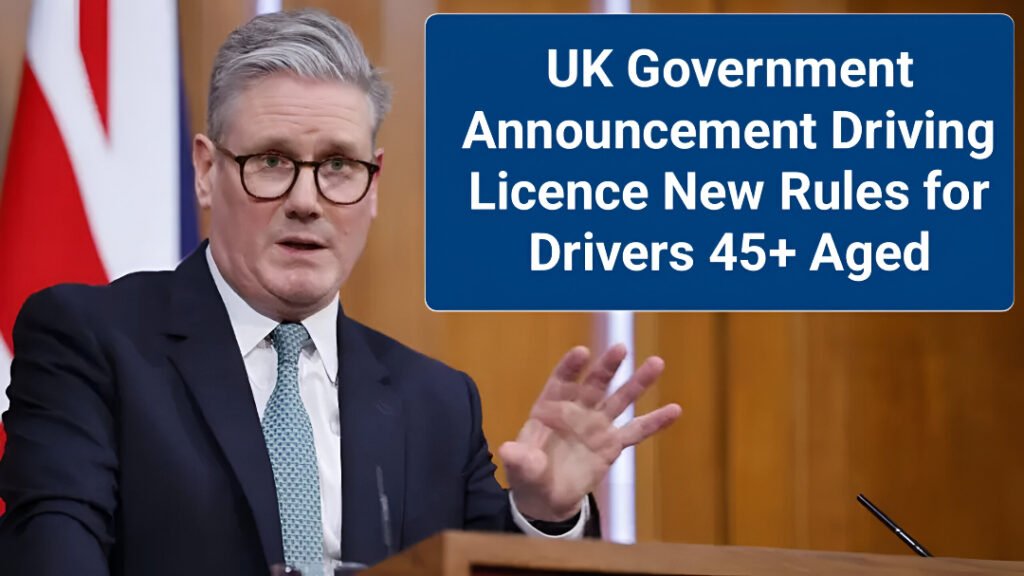Hello Everyone, The UK government has recently introduced important updates to driving licence rules, specifically affecting drivers aged 45 and above. These new regulations aim to enhance road safety, make licence renewals more efficient, and ensure that older drivers remain fit to drive.
If you are 45 or older, understanding these changes is crucial. This article explains what the new rules mean, who is affected, and the steps you need to follow to stay compliant.
Why the Government Introduced These Rules
The government wants to make UK roads safer for everyone. Research shows that as drivers age, some skills like reaction time, vision, and hearing may decline, increasing the risk of accidents. The main reasons for the new rules include:
-
Improving road safety for all road users.
-
Making licence renewals more standardised for drivers aged 45+.
-
Encouraging awareness about safe driving practices as people get older.
These measures are designed to help drivers continue driving safely while reducing the likelihood of accidents on the road.
Who Is Affected?
The changes mainly target drivers aged 45 and older. This includes:
-
Private car drivers
-
Drivers holding certain commercial licences
-
Drivers approaching renewal milestones
These updates apply across England, Scotland, Wales, and Northern Ireland, ensuring consistent rules nationwide.
Key Updates to the Driving Licence Rules
Here’s what’s changing for drivers 45 and older:
-
Medical Declarations: Drivers may need to report any health issues that could affect driving ability during renewal.
-
Renewal Frequency: Certain drivers may need to renew their licences more frequently to ensure safety.
-
Vision and Hearing Checks: Proof of adequate eyesight and hearing may be required for some licence categories.
-
Digital Licence Options: The government encourages switching to digital licences to simplify renewals and updates.
These changes balance safety with convenience, ensuring responsible drivers are not overburdened.
How Will Licence Renewal Work?
The renewal process will remain familiar but with some additional steps:
-
Notification: Drivers will receive reminders from the DVLA when it’s time to renew.
-
Medical Declaration: Declare any health conditions affecting driving.
-
Vision Check: Confirm eyesight meets legal standards.
-
Submit Application: Renew your licence online, by post, or in person at DVLA offices.
Following these steps ensures your licence remains valid and compliant with the new rules.
Medical Conditions That Could Affect Driving
Some conditions may require additional attention:
-
Heart problems, irregular heart rhythms
-
Diabetes (especially insulin-dependent)
-
Neurological disorders such as epilepsy or Parkinson’s
-
Vision or hearing impairment
It’s important to declare all relevant health issues. Failing to do so may result in fines or licence suspension.
Benefits of the New Rules
While some drivers may see the changes as extra work, the benefits are clear:
-
Road safety: Reduced risk of accidents for older drivers.
-
Early health detection: Identify medical conditions that could impact driving.
-
Simplified digital management: Easier licence renewals online.
-
Peace of mind for families: Loved ones can feel secure knowing older drivers are fit for the road.
These rules ultimately help maintain safety and confidence for drivers and their communities.
Penalties for Non-Compliance
Drivers who ignore the new rules may face:
-
Fines for driving with an expired or non-compliant licence
-
Licence suspension or revocation
-
Legal consequences if an accident occurs and undeclared medical conditions were a factor
Timely compliance is essential to avoid penalties.
Tips for Smooth Licence Renewal
To make the process easier:
-
Keep documents ready: Gather medical records, vision test results, and previous licence details.
-
Renew early: Don’t wait until your licence expires.
-
Use official channels: DVLA website or authorised offices.
-
Consult your GP: If unsure about medical conditions affecting your licence.
-
Consider digital licences: They simplify renewal and reduce paperwork.
Being proactive ensures a hassle-free renewal process.
Frequently Asked Questions (FAQ)
Q: Do all drivers 45+ need a medical check?
A: Only those with medical conditions or certain licence categories require additional checks.
Q: Will my standard car licence be affected?
A: Most private car drivers will follow similar renewal procedures with some added documentation.
Q: How often will I need to renew my licence?
A: Generally every 10 years, but some drivers may have shorter intervals based on licence type or health conditions.
Q: Can I drive while renewing my licence?
A: Yes, as long as your current licence is valid. Apply early to avoid any gaps.
Conclusion
The UK government’s new rules for drivers aged 45+ are aimed at improving road safety while keeping the process manageable. By understanding the requirements, updating medical information if necessary, and considering digital licences, drivers can continue to drive safely and confidently.
If you are 45 or older, take action today: check your licence status, gather necessary documents, and ensure compliance. These steps will help you stay safe, legal, and worry-free on the road.
